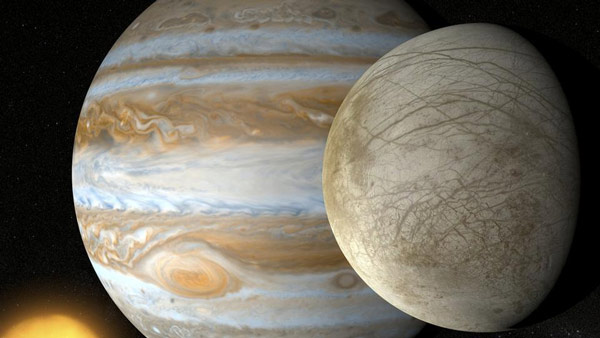NASA is about to announce a new discovery about Jupiter moon tonight
NASA's press conference will reveal findings that are important for finding life on Europa's moon.

The ocean hidden under the moon Europa can contain life.(Photo: NASA.)
The US Aerospace Agency (NASA) will host an online press conference to announce the latest analysis of Jupiter's moon Europa, one of the most promising places to find life in the solar system. The press conference will take place at 1 pm on May 14 in the US, at 0 pm on May 15, Vietnam time, IFL Science reports.
Lori Glaze, director of NASA's Planetary Science Division (PSD) and JoAnna Wendel, PSD's communications leader, will host the press conference. Guests included Xianzhe Jia, associate professor of the Department of Meteorology and Space at the University of Michigan, Ann Arbor; Elizabeth Turtle, a researcher at the Johns Hopkins Applied Physics Laboratory at Laurel, Maryland; Margaret Kivelson, emeritus professor of Space Physics at the Department of Earth and Space Sciences at the University of California, Los Angeles.
attracted much attention from astronomers. In 2022, NASA intends to launch a spacecraft to this moon for detailed research. Dubbed Europa Clipper, the ship will fly in wide orbit around Jupiter and plunge down to the celestial surface for 45 flights. Researchers believe that Jupiter's frozen moon has an underground ocean hidden deep beneath the surface. The mission may also include landing equipment deployment.
" Europa has long been a top priority for exploration because underneath its ice cover is a seawater-containing ocean, NASA's Europa Clipper, scheduled to launch in 2022, will equip the necessary equipment to determining whether Europa contains life-support materials as we know it, " NASA said.
In 2016, data from the Hubble Space Telescope showed that there could be an ocean eruption column on Europa, similar to Saturn's moon Enceladus. These sprays are very useful, because they allow the specimen to be taken from the ocean without going under the ice.
- NASA's dead satellite finds extremely important traces of life on Europa
- NASA holds press conference to announce: Is there life on Jupiter's Moon Europa?
- NASA prepares to explore the beautiful moon of Jupiter
- NASA announces plans to explore Jupiter's Moon
- Perspective settled on Europa
- Tonight is the best time to see Jupiter
- Is there life on Jupiter's moon Europa?
- Finding 2 more moons around Jupiter
- Giant planet approaching the Earth, showing off 4 moons
- Unbelievably unexpected about dozens of moon Jupiter satellites
- NASA extraordinary meeting, can announce life proof on Mars
- NASA decided on the moon after Obama's re-election
 Van Allen's belt and evidence that the Apollo 11 mission to the Moon was myth
Van Allen's belt and evidence that the Apollo 11 mission to the Moon was myth The levels of civilization in the universe (Kardashev scale)
The levels of civilization in the universe (Kardashev scale) Today Mars, the sun and the Earth are aligned
Today Mars, the sun and the Earth are aligned The Amazon owner announced a secret plan to build a space base for thousands of people
The Amazon owner announced a secret plan to build a space base for thousands of people